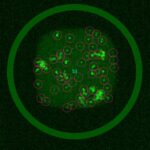Lien vers HAL – Cliquez ici
Lien DOI – https://doi.org/10.1371/journal.pone.0303630
https://doi.org/10.1371/journal.pone.0303630
The emergence of new resistant bacterial strains is a worldwide challenge. A resistant bacterial population can emerge from a single cell that acquires resistance or persistence. Hence, new ways of tackling the mechanism of antibiotic response, such as single cell studies are required. It is necessary to see what happens at the single cell level, in order to understand what happens at the population level. To date, linking the heterogeneity of single-cell susceptibility to the population-scale response to antibiotics remains challenging due to the trade-offs between the resolution and the field of view. Here we present a platform that measures the ability of individual E. coli cells to form small colonies at different ciprofloxacin concentrations, by using anchored microfluidic drops and an image and data analysis pipelines. The microfluidic results are benchmarked against classical microbiology measurements of antibiotic susceptibility, showing an agreement between the pooled microfluidic chip and replated bulk measurements. Further, the experimental likelihood of a single cell to form a colony is used to provide a probabilistic antibiotic susceptibility curve. In addition to the probabilistic viewpoint, the microfluidic format enables the characterization of morphological features over time for a large number of individual cells. This pipeline can be used to compare the response of different bacterial strains to antibiotics with different action mechanisms.






